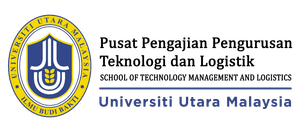THE IMPLEMENTATION OF MYORGANIC: A CASE STUDY OF KOPERASI ABSB
DOI:
https://doi.org/10.32890/jtom2018.13.2.8Keywords:
Myorganic, paddy, implementationAbstract
Rice is a staple food and daily routine for Malaysians. Currently, the increasing population in Malaysia has led to the need to increase rice production with more quality. Therefore, the government established a scheme with national organic standards, MS 1259: 2015 which is myOrganic certification to recognize organic farms. Koperasi ABSB is the first rice farm that obtained this certification. Thus, the aims of this study are to explore the implementation of myOrganic in Koperasi ABSB and the barriers faced by this cooperative to implementing myOrganic certification. Qualitative method is used in this case study through interviews and observation. The finding showed that the implementation of myOrganic is as follows, by register myGAP, register myOrganic, Department of Agricultural Malaysia (DOA) will send a supervisor, prepare nine files or records, perform internal and external audit, and renew myOrganic. This study is expected to increase awareness of organic farming practices and promote the implementation of myOrganic in agriculture industry especially for the new farmer who wants to register and obtain myOrganic certification.
Metrics
References
DOA. (2014). Konvensyen pensijilan myGAP dan SOM. EPF Learning Centre (ESSET). Selangor.
DOA. (2015). Reports on the progress production for organic certified farm. Jabatan Pertanian Malaysia. Putrajaya.
DOA. (2016). Senarai penerima SOM. Retrieved on 29th November 2017 from http://pertanian.kedah.gov.my/index.php/2013-12-08-08-03-59/pensijilan-skim-organik-malaysia-som
Hasan, Q. & Othman, Z. (2017). Organic farming and Halalan Toyyiban Foods: An attempt to relate them. Biotech sustainability, 376-385.
IFOAM. (2003). IFOAM annual report 2012. International Federal of Organic Agriculture Movement, Tholey-Teley, German. Retrieved on October 10, 2017 fromwww.ifoam.org/about_ifoam/inside_ifoam/pdfs/IFOAM_Annual_Report_2002.pdf
Lea, E., & Worsley, T. (2005). Australians’ organic food beliefs, demographics and values. British Food Journal, (11), 855-869.
Lomas, J. (1993). Diffusion, dissemination, and implementation: who should do what? Annals of the New York Academy of Sciences, 703(1), 226-237.
Miles, M. B., & Huberman, A. M. (1994). Qualitative data analysis: An expanded sourcebook. 2nd ed. Thousand Oaks, Califf: Sage.
Merriem, S. B. (1998). Qualitative research and case study applications in education. 2nd ed. San Francisco: Jossey-Bass.
MOA. (2016). Skim Organik Malaysia (SOM). Retrieved on 29th September 2017 from http://www.moa.gov.my/web/guest/som
Othman, Z., A. Muhammad & M.A.A. Bakar, (2010). A sustainable paddy farming practice in West Malaysia. Int. J. Interdisciplinary Soc. Sci., 5, 425-438.
Othman, Z. & Muhammad, M. (2011). Design strategies to persuasive learning for promoting sustainable practices in paddy farming. American Journal of Economics and Business Administration 3 (1), 197-202.
Ramli, B. (2002). The development of organic farming in Malaysia. Paper presented at workshop on Green Productivity and Natural Farming, Seoul, Korea. Asian Productivity Organization (APO).
Rosnani, H., Syahrin, S., Mohd. Zaffrie, M.A., Nurul Huda, S. & Noorhayati, S. (2015). Prospek dan tanda aras teknologi pertanian terpilih: Teknologi pengeluaran padi. Dalam: Laporan Projek Sosioekonomi 2013 – 2014, Serdang: MARDI.
Rozhan, A.D., Ahmad Zairy, Z.A. & Abu Kasim, A. (2009). Consumers' perception, consumption and preference on organic product: Malaysian perspective. Economic and Technology Management Review, (4), 95-107.
Shiffman R. N., Michel, G., Essaihi, A., & Thornquist, E. (2004). Bridging the guideline implementation gap: A systematic, document-centered approach to guideline implementation. Journal of the American Medical Informatics Association. 11 (5): 418-426.
Suhaimee, S., Ibrahim, I. Z., & Abd Wahab, A. M. (2016). Organic agriculture in Malaysia. Malaysian Agricultural Research and Development Institute (MARDI)
Downloads
Published
How to Cite
Issue
Section
License
Disclaimer
The Journal of Technology and Operation Management (JTOM) has taken all reasonable measures to ensure that material contained in this website is the original work of the author(s). However, the Journal gives no warranty and accepts no responsibility for the accuracy or the completeness of the material; no reliance should be made by any user on the material. The user should check with the authors for confirmation. Articles published in the Journal of Technology and Operation Management (JTOM) do not represent the views held by the editors and members of the editorial board. Authors are responsible for all aspects of their articles except the editorial screen design.














